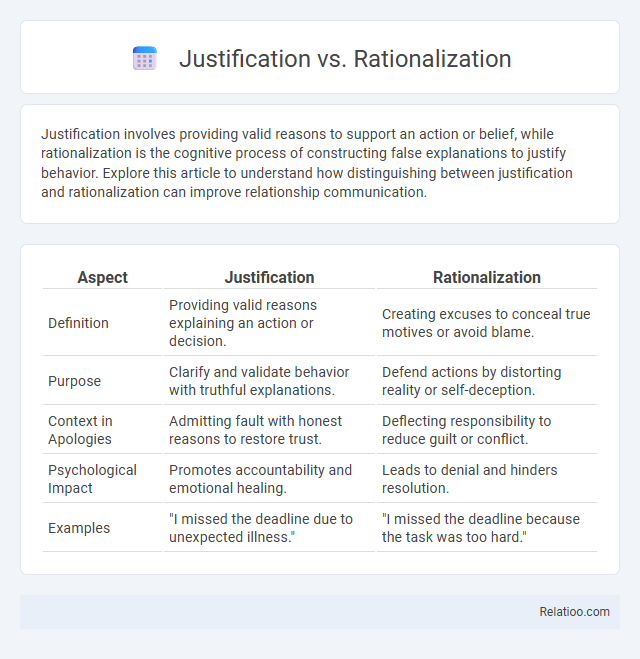Justification involves providing valid reasons to support an action or belief, while rationalization is the cognitive process of constructing false explanations to justify behavior. Explore this article to understand how distinguishing between justification and rationalization can improve relationship communication.
Table of Comparison
| Aspect | Justification | Rationalization |
|---|---|---|
| Definition | Providing valid reasons explaining an action or decision. | Creating excuses to conceal true motives or avoid blame. |
| Purpose | Clarify and validate behavior with truthful explanations. | Defend actions by distorting reality or self-deception. |
| Context in Apologies | Admitting fault with honest reasons to restore trust. | Deflecting responsibility to reduce guilt or conflict. |
| Psychological Impact | Promotes accountability and emotional healing. | Leads to denial and hinders resolution. |
| Examples | "I missed the deadline due to unexpected illness." | "I missed the deadline because the task was too hard." |
Understanding Justification and Rationalization
Understanding justification involves providing logical reasons or evidence to support a belief or action, demonstrating its validity and ethical soundness. Rationalization, however, refers to the cognitive process of explaining behavior or decisions with seemingly logical reasons, often masking the true motives or emotions behind them. Distinguishing between justification and rationalization reveals the difference between honest defense based on facts and self-deceptive reasoning to avoid guilt or criticism.
Defining Key Concepts: Justification vs Rationalization
Justification provides legitimate reasons or evidence supporting a decision or action, emphasizing accuracy and validity, while rationalization involves creating seemingly logical explanations to justify behaviors or beliefs often driven by emotional or psychological needs rather than objective truth. Understanding the distinction between justification and rationalization helps you critically evaluate your motivations and avoid self-deception. Defining these key concepts clarifies how your reasoning aligns with facts versus subjective interpretations.
Psychological Roots of Justification
Justification is a cognitive process where Your mind provides valid reasons to support a behavior or belief, aiming to reduce cognitive dissonance and maintain self-esteem. Unlike rationalization, which often constructs false or exaggerated excuses to mask true motives, justification is rooted in genuine psychological needs for coherence and identity preservation. Understanding the psychological roots of justification reveals how Your brain seeks internal consistency and social approval by aligning actions with personal values and norms.
The Cognitive Process Behind Rationalization
Rationalization involves the cognitive process where individuals create seemingly logical explanations to justify behaviors, decisions, or feelings that may otherwise be perceived as irrational or socially unacceptable. Unlike justification, which is based on objective reasoning and factual evidence, rationalization serves as a psychological defense mechanism to protect self-esteem and reduce cognitive dissonance. This cognitive bias often leads to altered perception of reality, enabling people to reconcile contradictory beliefs without acknowledging underlying emotional discomfort.
Key Differences Between Justification and Rationalization
Justification involves providing valid reasons or evidence to support an action or belief, ensuring it aligns with facts and ethical standards, whereas rationalization is creating excuses or false reasons to make unacceptable behavior or decisions seem acceptable. The key difference lies in the authenticity and truthfulness of the explanation: justification is based on objective truth, while rationalization is often self-deceptive and subjective. Understanding these differences helps you critically evaluate motives and improve decision-making integrity.
Common Examples in Everyday Life
Justification often involves providing valid reasons for actions such as explaining a late arrival due to traffic, while rationalization refers to creating seemingly logical excuses to hide true motives, like blaming tiredness for procrastination. For instance, a student justifies missing homework by citing illness, whereas rationalization occurs when the student claims the assignment was unnecessary to avoid guilt. Confusion arises because justification and rationalization both aim to defend behavior, but justification is grounded in truth, whereas rationalization distorts reality to reduce self blame.
Impact on Decision-Making and Behavior
Justification involves providing valid reasons based on facts that support a decision, enhancing transparency and accountability in decision-making processes. Rationalization often occurs post-decision, where individuals construct logical but sometimes flawed explanations to defend choices, potentially leading to biased behavior and reduced learning from mistakes. Understanding the distinction improves critical thinking, allowing for more objective evaluations and fostering behavior aligned with genuine reasoning rather than self-deception.
Recognizing Rationalization in Yourself and Others
Recognizing rationalization in yourself and others involves identifying when reasons given are not genuine explanations but attempts to justify actions or beliefs after the fact. Unlike justification, which provides valid and logical grounds for behavior, rationalization often masks true motivations or uncomfortable feelings. Understanding this distinction helps you cultivate honesty and improve decision-making by addressing root causes rather than excuses.
Overcoming the Urge to Rationalize
Overcoming the urge to rationalize requires recognizing the difference between justification, which provides valid reasons based on facts, and rationalization, which involves creating false or distorted explanations to defend actions or beliefs. Developing self-awareness helps individuals identify biased thinking patterns and replace them with objective reasoning rooted in evidence and accountability. Emphasizing honest reflection and critical thinking reduces reliance on rationalizations and promotes more authentic decision-making processes.
Practical Strategies for Healthy Self-Justification
Practical strategies for healthy self-justification focus on distinguishing between justification and rationalization by promoting honest self-reflection and accountability. You can develop self-awareness by critically evaluating your motives and actions without resorting to distorted reasoning that protects ego at the expense of truth. Emphasizing clarity and integrity in your thought process helps foster authentic justification, enhancing personal growth and emotional well-being.

Infographic: Justification vs Rationalization
 relatioo.com
relatioo.com